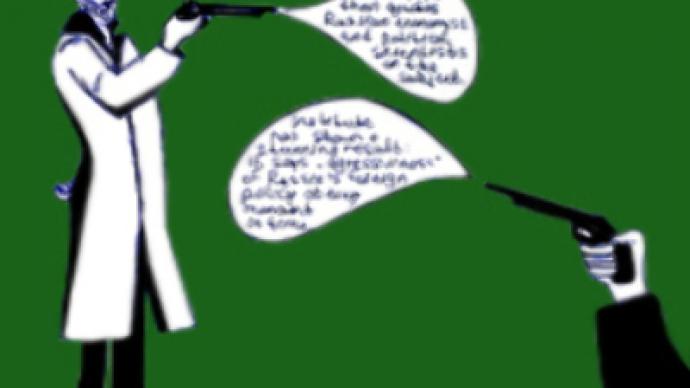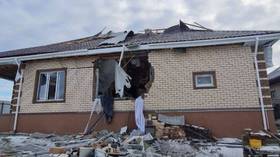RT Expert View: religious hopes, secular fears

This week we look at the revival of the Russian Orthodox Church and the possibility of Russia becoming a country dominated by religion.
Peter Lavelle, RT’s political commentator and anchor
In the past week the Patriarch of the Russia Orthodox Church Aleksy II was laid to rest. He headed the Church for 18 years.
No one doubts he played a major role in the revival of the Church and the return of religious values in public life. Today the state sees the Orthodox Church as a partner. But has this relationship gone too far? Is the Church too close to the state and does this relationship marginalize other churches and religions in Russia? Should the next patriarch create some distance from the state?
Sergei Roy, editor,
Before I reply to these legitimate questions, I must define what Albert Einstein called “the position of the observer”: how do I stand in relation to religion in general and the Russian Orthodox Church in particular? Though these things are generally regarded as fairly intimate and one’s personal, even private business, I think that clarity in this area may throw light on the writer’s bias or lack thereof. My position here is quite clear, if somewhat negative: I come from a background that has been Voltairean since about the times of Voltaire. This particularly applied to the male line, who were liable to exercise their wit, if not wits, at the expense of unshaven Russian priests (popy), and were also frequently accused of following the Bacchus and Venus cults rather than any modern religious or atheist orientations. In the female line there was a tendency to observe the rituals of the Russian Orthodox Church and, in a few isolated cases, of Roman Catholicism, but this last was looked upon as some kind of fashionable nonsense by the rest. It is easy to see why I comfortably fell in with prevailing Soviet atheism, though I hated most heartily what was being done to the Church, its servants and followers, and especially to aesthetically gratifying things like churches, belfries, icons, monasteries, etc. This attitude should explain why, toward the end of perestroika, an unbeliever like me – and there were millions of people like me – welcomed the return of the Church to Russia’s public life and the restoration of its stature and physical and moral presence with warmth rather than hostility or tepid acceptance. Now, the most highly visible, emblematic figure of this restoration process was, of course, His Holiness Patriarch Aleksy II of Moscow and All Russia, may God rest his soul. He became that kind of symbol even before his enthronement in 1990 after Patriarch Pimen’s death: in 1989 Aleksy was elected to the Congress of People’s Deputies. I must insist that his participation in the earth-shattering events that attended the sessions of the Congress largely pre-determined the role Aleksy II was to play not just in the revival of the Russian Orthodox Church but in the state affairs of Russia, an issue that is of particular interest for us here. The State and the Church; that is indeed a thorny issue and a highly complex one: Russia is constitutionally a secular state, everyone is supposed to enjoy freedom of conscience, freedom to believe or not to believe anything – yet we constantly see religious leaders, and most prominently, leaders of the Russian Orthodox Church, participating in state and public affairs in ways that are far from purely ritualistic. My take on this is simple: in the given historical circumstances, Patriarch Aleksy II could not have acted differently from the way he acted – with wisdom, tact, dignity, forbearance, but with vigour and resolution whenever the occasion called for it. Consider the coup of August 1991, those several days when Russia could have slipped back into the rut of Soviet Communism. Did Aleksy II withdraw to his residence to pray in solitude for God to intercede and prevent bloodshed? No, he did not. He spoke harshly against the arrest of the country’s lawfully elected president Gorbachev, he actually anathematized the junta that attempted to grab supreme power in the land; his appeal was heard over the loudspeakers by the troops preparing to attack us. As someone who spent those awful 72 hours behind a barricade by the White House of Russia building, I absolutely believe that Aleksy II did his duty before God and man in the only possible way. And so it went on. There was another attempted coup and threat of fratricidal civil war in October 1993, the start of the war in Chechnya in early 1995, radical liberal reforms that left nearly half the nation below the poverty line, the 1998 financial meltdown, terrorist acts all over Russia, and an all too gradual restoration of normalcy in the eight years of Vladimir Putin’s presidency. It took great wisdom and faith to lead the Russian Orthodox Church and the people of Russia through these turbulent years, and the events left the patriarch no chance to withdraw from public life into monastic solitude or limit his activities to church affairs only. His spiritual leadership has been eagerly recognized by the highest officials of Russia as well as by about two thirds of Russia’s population who count themselves as believers (church attendance, just like the world over, is a different matter, of course). Critics may say that under Aleksy II the Russian Orthodox Church began to play too great a role in the affairs of state in Russia. All I can say is, thank God that the country was led by people like the late patriarch, not his critics. And I wish to God that his successor will conduct himself likewise.












